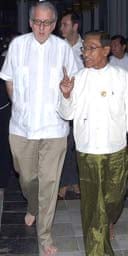A UN human rights envoy today visited a prison for political prisoners at the start of an investigation into the number of people killed and detained when the Burmese junta crushed pro-democracy protests.
Paulo Sergio Pinheiro, the UN's independent rights investigator for Burma, spent at least two hours at Rangoon's notorious Insein prison, where political prisoners have been tortured and held in solitary confinement.
Pinheiro, who was back in Burma after a four-year ban, also visited the Ngwe Kyar Yan monastery on the outskirts of Rangoon, which was raided by troops in late September after monks sparked off the most serious challenge to the junta in almost 20 years.
The abbot of the monastery, U Yawata, said at the time that 70 monks and lay disciples had been seized during the raid, one of many in which monks were beaten and hauled off in trucks by soldiers. U Yawata said there were bloodstains on beds after soldiers fired around the complex and stole gold.
The Burmese government has said that 10 people were killed when troops fired on peaceful protesters in Rangoon on September 26 and 27. Diplomats and dissidents, however, put the number much higher and say that an unknown number of people remain in prison.
Pinheiro cited unidentified sources as alleging last month that between 30 and 40 monks and 50 to 70 civilians had been killed. The UN human rights council condemned the crackdown at an emergency session last month and urged an immediate investigation of the rights situation in Burma.
Pinheiro has a troubled history with the junta. He abruptly cut short a visit in March 2003 after finding a listening device in a prison room where he was interviewing political detainees. He has been barred from the country since November 2003.
Pinheiro, who arrived in Burma yesterday, has been allowed back after recent contacts between the junta and the UN. His trip follows a six-day visit by the UN envoy, Ibrahim Gambari, who attempted to start a dialogue between the junta and the opposition leader, Aung San Suu Kyi.
Suu Kyi, who was allowed to meet the leaders of her opposition party on Friday for the first time in three years, said through a party spokesman that she was "very optimistic" about the prospects for dialogue.
